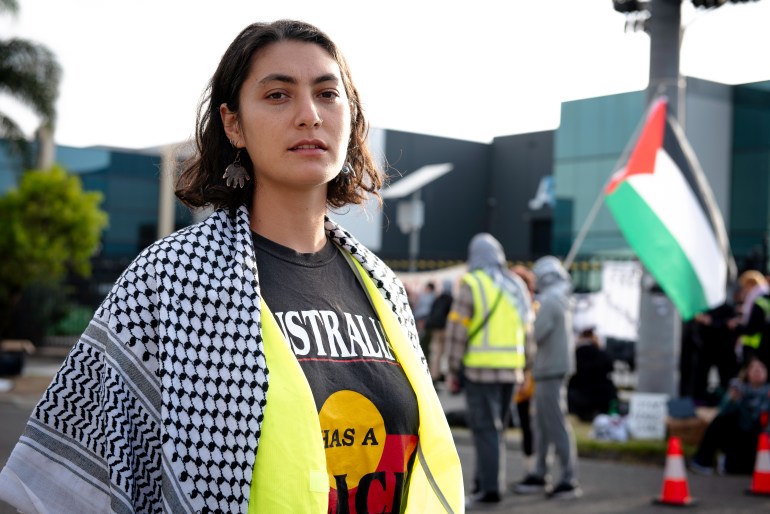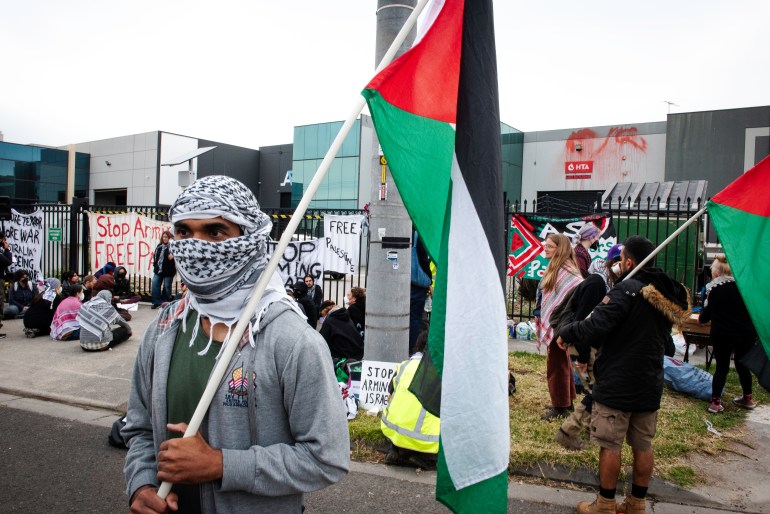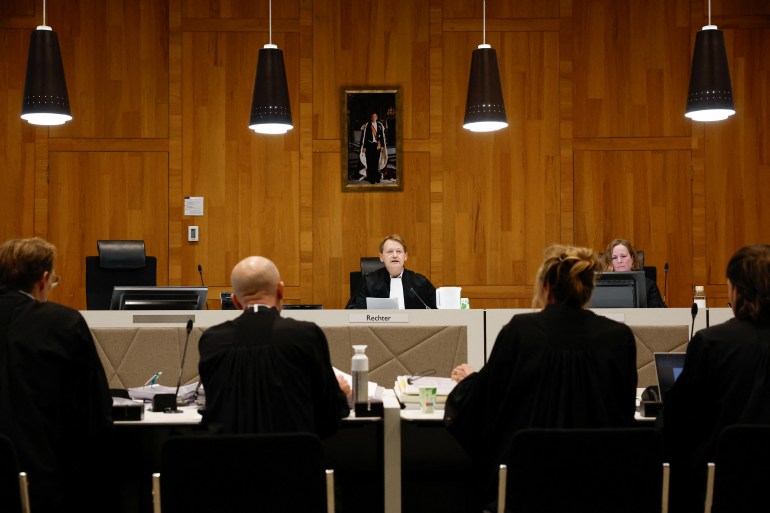Australia challenged on ‘moral failure’ of weapons trade with Israel | Israel War on Gaza News

[ad_1]
Melbourne, Australia – Israel’s continued assault on Gaza has highlighted a hidden yet crucial component of the world’s weapons manufacturing industry – suburban Australia.
Tucked away in Melbourne’s industrial north, Heat Treatment Australia (HTA) is an Australian company that plays a vital role in the production of F-35 Joint Strike Fighters; the same model that Israel is using to bomb Gaza.
Weekly protests of about 200 people have been taking place for months outside the nondescript factory, where heat treatment is applied to strengthen components for the fighter jet a product of US military giant Lockheed Martin.
While protesters have sometimes brought production to a halt with their pickets, they remain concerned about what’s going on inside factories like HTA.
“We decided to hold the community picket to disrupt workers, and we were successful in stopping work for the day,” community organiser Nathalie Farah told Al Jazeera. “We consider this to be a win.”
“Australia is absolutely complicit in the genocide that is happening,” said 26-year-old Farah, who is of Syrian and Palestinian origin. “Which is contrary to what the government might have us believe.”
More than 32,000 Palestinians have been killed since Israel launched its war in Gaza six months ago after Hamas killed more than 1,000 people in a surprise attack on Israel. The war, being investigated as a genocide by the International Court of Justice (ICJ), has left hundreds of thousands on the brink of starvation, according to the United Nations.
HTA – which did not respond to Al Jazeera for comment – is just one of an increasing number of companies in Australia engaged in the weapons manufacturing industry.

According to Lockheed Martin, “Every F-35 built contains some Australian parts and components,” with more than 70 Australian companies having export contracts valued at a total 4.13 billion Australian dollars ($2.69bn).
Protesters have also picketed Rosebank Engineering, in Melbourne’s southeast, the world’s only producer of the F-35’s “uplock actuator system”, a crucial component of the aircraft’s bomb bay doors.
Defence industry push
In recent years, the Australian government has sought to increase defence exports to boost the country’s flagging manufacturing industry.
In 2018, former Prime Minister Malcolm Turnbull announced Australia aimed to become one of the world’s top 10 defence exporters within a decade. It is currently 30th in global arms production, according to the Stockholm International Peace Institute.
It is an aspiration that appears set to continue under the government of Anthony Albanese after it concluded a more than one-billion-Australian-dollar deal with Germany to supply more than 100 Boxer Heavy Weapon Carrier vehicles in 2023 – Australia’s single biggest defence industry deal.
Since the Gaza war began, the industry and its business relationship with Israel have come increasingly under the spotlight.
Last month, Deputy Prime Minister Richard Marles insisted that there were “no exports of weapons from Australia to Israel and there haven’t been for many, many years”.
However, between 2016 and 2023 the Australian government approved some 322 export permits for military and dual-use equipment to Israel.
The Department of Foreign Affairs and Trade’s own data – available to the public online – shows that Australian exports of “arms and ammunition” to Israel totalled $15.5 million Australian dollars ($10.1m) over the same period of time.
Officials now appear to be slowing the export of military equipment to Israel.
In a recent interview with Australia’s national broadcaster ABC, the Minister for International Development and the Pacific Pat Conroy insisted the country was “not exporting military equipment to Israel” and clarified this meant “military weapons, things like bombs”.
However, defence exports from Australia fall into two categories, items specifically for military use – such as Boxer Heavy Weapons vehicles for Germany – and so-called ‘dual use’ products, such as radar or communications systems, that can have both civilian and military uses.
Australia’s Department of Defence did not respond to Al Jazeera’s requests about whether the halt to defence exports to Israel also included dual-use items.
What is certain is that companies such as HTA and Rosebank Engineering are continuing to manufacture components for the F-35, despite the risk of deployment in what South Africa told the International Court of Justice in December amounted to “genocidal acts“.
In the Netherlands – where parts for the jet are also manufactured – an appeal court last month ordered the Dutch government to block such exports to Israel citing the risk of breaching international law.
The Australian government has also come under scrutiny for its lax “end-use controls” on the weapons and components it exports.
As such, while the F-35 components are exported to US parent company Lockheed Martin, their ultimate use is largely outside Australia’s legal purview.
Lauren Sanders, senior research fellow on law and the future of war at the University of Queensland, told Al Jazeera that the “on-selling of components and military equipment through third party states is a challenge to global export controls.
“Once something is out of a state’s control, it becomes more difficult to trace, and to prevent it being passed on to another country,” she said.
Sanders said Australia’s “end use controls” were deficient in comparison with other exporters such as the United States.
“The US has hundreds of dedicated staff – with appropriate legal authority to investigate – to chase down potential end-use breaches,” she said.
“Australia does not have the same kind of end-use controls in place in its legislation, nor does it have the same enforcement resources that the US does.”

In fact, under legislation passed in November 2023, permits for defence goods are no longer required for exports to the United Kingdom and the US under the AUKUS security agreement.
In a statement, the government argued the exemption would “deliver 614 million [Australian dollars; $401m] in value to the Australian economy over 10 years, by reducing costs to local businesses and unlocking investment opportunities with our AUKUS partners”.
International law
This new legislation may provide more opportunities for Australian weapons manufacturers, such as NIOA, a privately owned munitions company that makes bullets at a factory in Benalla, a small rural town in Australia’s southeast.
The largest supplier of munitions to the Australian Defence Force, NIOA – which did not respond to Al Jazeera for comment – also has aspirations to break into the US weapons market.
At a recent business conference, CEO Robert Nioa said that “the goal is to establish greater production capabilities in both countries so that Australia can be an alternative source of supply of weapons in times of conflict for the Australian and US militaries”.
Greens Senator David Shoebridge told Al Jazeera that the government needed to “publicly and immediately refute the plan to become a top 10 global arms dealer and then to provide full transparency on all Australian arms exports including end users.
“While governments in the Netherlands and the UK are facing legal challenges because of their role in the global supply chain, the Australian Labor government just keeps handing over weapons parts as though no genocide was happening,” he said. “It’s an appalling moral failure, and it is almost certainly a gross breach of international law.”
The Australian government also recently announced a 917 million Australian dollar ($598m) deal with controversial Israeli company Elbit Systems.

Elbit has come under fire for its sale of defence equipment to the Myanmar military regime, continuing sales even after the military, which seized power in a 2021 coup, was accused of gross human rights violations – including attacks on civilians – by the United Nations and others.
Despite a recent joint announcement between the Australian and UK governments for an “immediate cessation of fighting” in Gaza, some say Australia needs to go further and cut defence ties with Israel altogether.
“The Australian government must listen to the growing public calls for peace and end Australia’s two-way arms trade with Israel,” Shoebridge said. “The Albanese government is rewarding and financing the Israeli arms industry just at the moment they are arming a genocide.”
Protests have continued both at the HTA factory in Melbourne and their premises in Brisbane, with organisers pledging to continue until the company stops manufacturing components for the F-35.
[ad_2]



